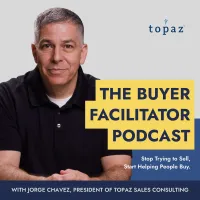Episode Transcript
Ever felt like you already know the answer before the client even finished their sentence?
Welcome to the Buyer Facilitator Podcast.
I'm Jorge Chavez, President and Co Founder of Topaz Sales Consulting.
In this episode, I'm going to talk about something deceptively simple, but incredibly powerful: how great salespeople identify their assumptions and flip them into questions that build trust, instead of tension.
When a typical salesperson hears information, they tend to jump to conclusions.
They make these assumptions.
They've heard that objection before, and they think they have the perfect response.
A well crafted rebuttal.
They have the solution.
But slow down and really listen.
Don't just listen to what's being said, but what's not being said.
Because often, the assumptions we make in silence drive the way we speak, the way we pitch, and even how we hear the buyer.
Assumptions happen, but instead of suppressing those assumptions, pause, name the assumption, and flip it into a thoughtful question.
Let me give you a real world example.
Say you're sitting in a discovery call, and your gut tells you that the person you're speaking with doesn't have decision making authority.
Now, most reps would quietly accept that and mentally start disqualifying the deal or pushing harder, But a buyer facilitator, they might say something like this: I'm wondering if this is something you'd be evaluating on your own, or if others need to weigh in.
See the difference?
You're no longer guessing, you're guiding, you're not pushing a pitch.
You're building trust.
And that brings us to something we teach here at Topaz that transforms how sales conversations unfold.
There are four question styles that top performing salespeople lean on, not just to gather info, but to shift the conversation, uncover hidden pain, and build credibility without posturing.
Now let's break each of them down.
First up, open ended questions.
These are your foundation, your way in.
Instead of asking, are you happy with your current provider?
Which gets you either a yes or no.
Try this one.
What's been your experience working with vendors in this space?
Or maybe: What prompted you to start exploring alternatives?
These questions invite the buyer to share their story, in their own words.
And when people feel heard, they open up.
You uncover priorities, pain points, and motivations that a checklist never will.
Second, investigative questions.
This is where you go a layer deeper.
Let's say the buyer says, our onboarding was a mess.
Instead of nodding and moving on, a buyer facilitator might ask, What felt disjointed about it?
Or, You mentioned the team's been frustrated.
Can you share what they've been saying specifically?
These questions show active curiosity, not scripted, not robotic, just real interest, and that builds trust.
Third, assumptive questions.
We don't pretend assumptions don't exist.
We use them, and we use them wisely.
Say the buyer's been talking about tighter budgets.
A smart rep might say, It seems like you've had to make some trade offs to keep costs down.
Is that something you're still navigating?
Or, It sounds like there's been pressure to prove ROI more quickly lately.
Am I on the right track?
Notice the language.
You're not claiming it as truth, you're just checking in.
These kinds of questions show confidence without arrogance.
They look for clarity, they flush out the real issues, And finally, there are transformational questions.
These are the questions that can shift the whole conversation.
They're bold.
They're reflective.
Sometimes even a little uncomfortable, but in a good way.
Transformational questions are the kind of questions that get people to stop and think a little harder.
Try asking, If nothing changes in the next six to twelve months, what does that mean for your team or your clients?
Or, what's the risk of staying where you are even if it feels safer today?
These questions are wake up calls.
They challenge the status quo.
And when you hear a buyer pause and say, no one's asked me that before, You know you asked a good one.
And you're no longer just a salesperson.
You're now a trusted advisor, what we call a buyer facilitator.
So what did we learn today?
That great selling is about asking the right questions, not assuming that your prospect is just like the others.
When you get new information, assumptions will pop into your head.
That's when you pause, name your assumptions, and flip them.
You create conversations that buyers actually want to be in.
If you want to explore more about sales questioning techniques, go to our website at topazsalesconsulting.com.
You'll find resources, videos, and tools to help you grow.
And hey, if your team needs training or you just want to talk shop, we'd love to hear from you.
As always, thank you for listening to the Buyer Facilitator Podcast.
And because you're still listening, I'm gonna go out on a limb and assume you've already subscribed.
Is that fair to say?
Great.
We'll see you next time.
